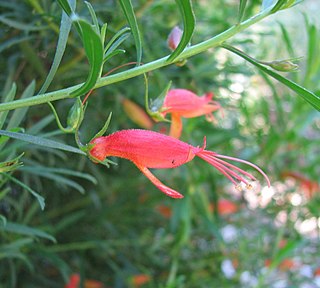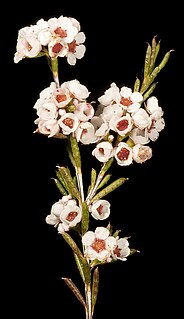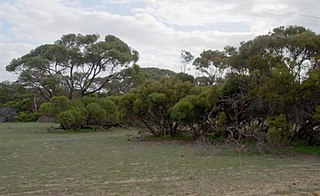John William Green is an Australian botanist.

Eremophila decipiens, commonly known as slender fuchsia bush or narrow-leaved fuchsia bush is a flowering plant in the figwort family, Scrophulariaceae and is endemic to an area extending from the south-west of Western Australia to southern parts of South Australia. It is low, sprawling shrub with lance-shaped leaves and red, orange or yellow flowers on a long, S-shaped stalk.

Campbellodus decipiens is an extinct ptyctodontid placoderm fish that lived around 380 million years ago. Its fossil remains have been found preserved in perfect three-dimensional form from the Gogo Formation of Western Australia. Originally it was described from large tooth plates and isolated skull roof bones by Miles & Young (1977). Long (1995) restored the complete fish based on new material found at Gogo in the mid 1980s, and described by Long (1997).

Chamelaucieae is a tribe of flowering plants within the family Myrtaceae, mostly from Australia, with a few species in New Caledonia and south-east Asia.
Grevillea decipiens is a shrub native to Western Australia.

Malleostemon is a genus of flowering plants in the myrtle family Myrtaceae, described as a genus in 1983, by John Green The entire genus is endemic to Western Australia.
- Malleostemon costatusRye & Trudgen
- Malleostemon decipiens(W.Fitzg.) Trudgen
- Malleostemon hursthousei(W.Fitzg.) J.W.Green
- Malleostemon microphyllusRye & Trudgen
- Malleostemon minilyaensisJ.W.Green
- Malleostemon nephroideusRye
- Malleostemon nerrenensisRye & Trudgen
- Malleostemon pedunculatusJ.W.Green
- Malleostemon peltiger(S.Moore) J.W.Green
- Malleostemon pustulatusRye
- Malleostemon roseus(E.Pritz.) J.W.Green
- Malleostemon tuberculatus(E.Pritz.) J.W.Green
- Malleostemon uniflorusRye
Grevillea sparsiflora, commonly known as the sparse flowered grevillea, is a shrub of the genus Grevillea native to an area along the south coast in the Goldfields-Esperance regions of Western Australia.

Eucalyptus decipiens, commonly known as redheart or redheart moit is a species of mallee or small tree that is endemic to Western Australia. It has varying amounts of rough, imperfectly shed ribbons of brownish bark and smooth whitish to grey bark, lance-shaped adult leaves, flower buds in groups of between eleven and twenty one, and conical to flattened hemispherical fruit.
Malleostemon hursthousei is a plant species of the family Myrtaceae endemic to Western Australia.
Malleostemon microphyllus is a plant species of the family Myrtaceae endemic to Western Australia.
Malleostemon costatus is a plant species of the family Myrtaceae endemic to Western Australia.
Malleostemon minilyaensis is a plant species of the family Myrtaceae endemic to Western Australia.
Malleostemon pedunculatus is a plant species of the family Myrtaceae endemic to Western Australia.
Malleostemon peltiger is a plant species of the family Myrtaceae endemic to Western Australia.
Malleostemon nephroideus is a plant species of the family Myrtaceae endemic to Western Australia.
Malleostemon nerrenensis is a plant species of the family Myrtaceae endemic to Western Australia.
Malleostemon pustulatus is a plant species of the family Myrtaceae endemic to Western Australia.
Malleostemon roseus is a plant species of the family Myrtaceae endemic to Western Australia.

Malleostemon tuberculatus is a plant species of the family Myrtaceae endemic to Western Australia.
Malleostemon uniflorus is a plant species of the family Myrtaceae endemic to Western Australia.





